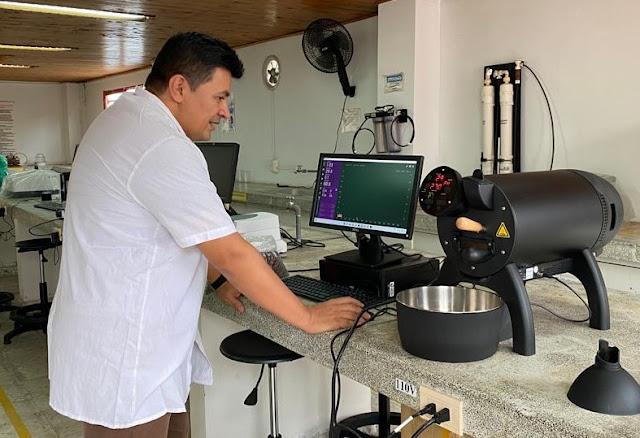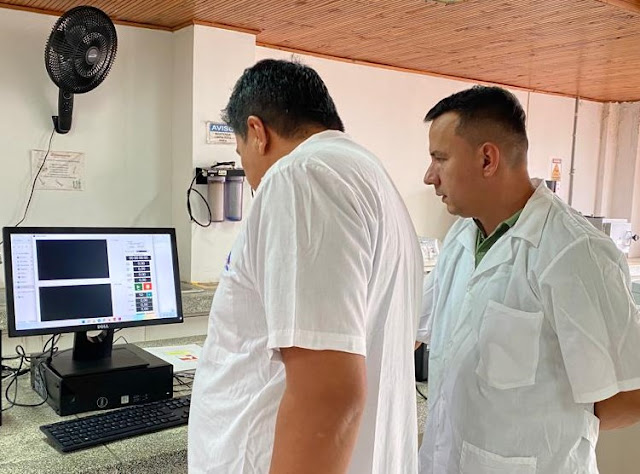Small-lot coffee farmers in Colombia can get a higher coffee price with a better method for drying their harvest, thanks to the work of researchers from the Caicedonia campus of the Universidad del Valle (Univalle).
In 2020, Colombia exported $US 2.54 billion dollars worth of coffee, becoming the fourth largest exporter of coffee in the world, but 96% are small-lot producers, that is, on average they have only 1.3 hectares of crops, according to figures from the National Federation of Coffee Growers of Colombia.
Professor Esteban Largo Avila, agricultural engineer, researcher and faculty of the Caicedonia campus said that for these producers, the greatest difficulty arises when drying their harvest in the sun, due to the climatic conditions characterized by rainy seasons with cloudy days with scarce hours of sunshine.
"If the drying is done in less time, the chemical compounds of the coffee are retained, which reflects more positive characteristics in the cup", explained Professor Largo.
To this end, Professor Largo worked with Professor Carlos Hernan Suarez Rodriguez (also from Caicedonia), to develop a prototype of a dryer with inexpensive sensors that allows the control of the air temperature inside the dryer with an accuracy of 1 to 1.5 degrees Celcius of the ideal temperature, with the results of the project published in the study called “Efecto del secado mecánico en la calidad en taza del café especial producido en Caicedonia y Sevilla (Valle del Cauca)”
 |
| Photo: Coffee roasting process. Credit: Esteban Largo |
Towards Better Coffee
Since 2019, the Caicedonia branch of Univalle has focused on researching the fermentation, drying and roasting stages of specialty coffees, to help small-lot coffee growers in the municipalities of Caicedonia and Sevilla in the northern Valle de Cauca.
"Specialty coffees pays the bills that these families have, but we are talking about microlots: kilograms or pounds of coffee with specific faces with a differentiated sensory profile that can achieve a better price," Professor Largo said, adding that in 2022 the Caicedonia campus was opened Roast Lab Univalle, in order to deepen this research and provide extension services and coffee analysis to coffee growers in the region.
Professor Carlos Hernán Suarez Rodríguez, a systems engineer, professor at the Caicedonia campus and co-investigator of the project, explained that there are many possibilities from open source electronic creation platforms, which can be affordable for small producers.
"If we cannot measure variables, it is not possible to have control them," Professor Suarez said, adding that the researchers used Arduino, an open source electronic platform based on easy-to-use hardware and software.
"The instrumentation of the prototype is very economical, for example, a temperature sensor cost 8000 Colombian pesos, (less than two U.S. dollars), and the software we developed is within the financial reach of coffee growers," Professor Suarez said.
Read more from the School of Food Engineering: Univalle Researchers Developing Exotic Fruit Extractions to Add Value for Farmers
 |
| Photo: Solar drying in canopy. Credit: Esteban Largo |
Benefits to Coffee Growers
The municipalities of Caicedonia and Sevilla are known for specialty coffee: The municipality of Caicedonia has 3,612.24 hectares planted in coffee, with more than 508 coffee growers; and the municipality of Sevilla has a planted area of 7,594 hectares.Alejandro Macias, a coffee grower born and raised in the municipality of Caicedonia, Valle del Cauca, said that the collaboration between researchers and coffee growers has already produced results.
"With the Universidad del Valle and with the professor Esteban Largo research processes have been advanced, in general, in everything that is part of the improvement of the quality in the cup and qualities of coffee," Macias said, adding that the improvement was through drying and some aspects that can be measured after the drying of the coffee is finished.
"Finally the project is for coffee growers in general to improve not only the quality in cup, but also to improve the sale price and allows coffee growers to have better conditions so that their cultivation and living can be easier and fairer," Macias said.
Read more about the regional campuses: Why do Mexicans appear to have a better knowledge of human-computer interaction than Colombians? (Tuluá Campus)
 |
| Photo: The regional campus of the Universidad del Valle in Caicedonia. Credit: Universidad del Valle. |
The Caicedonia Campus
Through the regionalization system, since June 26, 1986, there are facilities for the operation of a headquarters of the Universidad del Valle, which mainly houses students from the northeast of the Valley, that is, from the municipalities of Caicedonia and Sevilla, it has also had students from the department of Quindío, from the municipalities of Armenia, Calarcá, Circasia, Génova, Pijao, Barragán and other nearby towns.
Academic programs are offered in Agro-environment and Software Development, among others. Professor Largo said that the location of the regional campus is a great help to researchers.
"The region is like a natural laboratory: five minutes away from the campus of Caicedonia, we can find coffee farms with many varieties," Professor Largo said.

Comentarios
Publicar un comentario